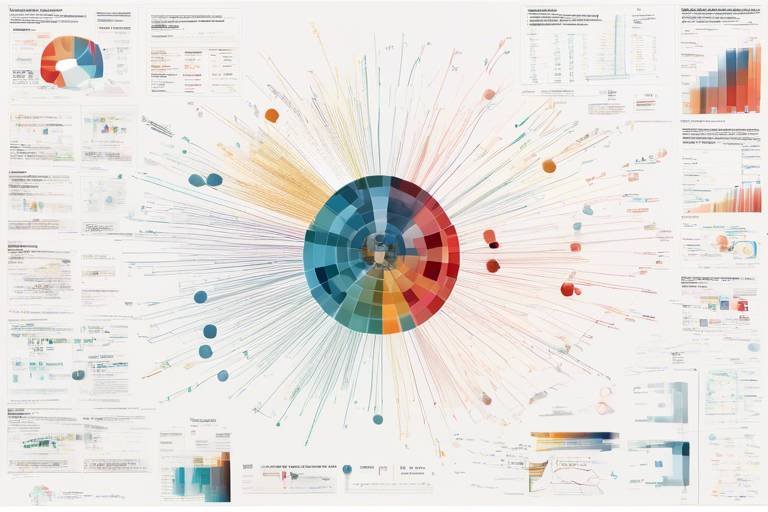How Technology is Enhancing Genetic Research
In the realm of science, few areas have seen as much **transformation** as genetic research, and the driving force behind this change is none other than **technology**. Imagine a world where scientists can precisely edit genes to eradicate diseases, or where vast amounts of genetic data can be analyzed in mere seconds—this is not science fiction; it's the reality we live in today. The integration of advanced technologies into genetic research is not just enhancing our understanding of genetics; it's revolutionizing the way we approach health and disease.
At the heart of this revolution lies **gene editing**. Recent breakthroughs, particularly in **CRISPR technology**, have opened doors that were once thought to be locked forever. CRISPR allows researchers to make precise modifications to DNA, akin to editing a text document. This capability is monumental, as it paves the way for significant medical advancements, from correcting genetic mutations that cause diseases to potentially eradicating hereditary conditions altogether. The simplicity and efficiency of CRISPR make it a game-changer in the field of genetics.
But the implications of technology in genetic research extend far beyond gene editing. The advent of **big data analytics** has enabled researchers to sift through mountains of genetic information, uncovering patterns that were previously hidden. With the ability to analyze vast datasets, scientists can now make informed predictions about genetic traits and disease susceptibility. This is particularly important in a world where understanding the genetic basis of diseases can lead to more effective treatments and preventative measures.
One of the most exciting developments in this space is the application of **machine learning**. Imagine having a powerful assistant that can interpret complex genetic data with incredible accuracy—this is what machine learning brings to the table. By utilizing advanced algorithms, researchers can enhance their predictions about disease outcomes and identify potential therapeutic targets. This not only speeds up the research process but also increases the likelihood of successful interventions in the future.
Moreover, the use of **predictive modeling techniques** is gaining traction. These techniques leverage genetic data to forecast disease risk, which is crucial for personalized medicine approaches. Think of it as having a crystal ball that can reveal the likelihood of developing certain conditions based on your genetic makeup. This tailored approach to treatment not only improves patient outcomes but also empowers individuals to take charge of their health.
In addition to these advancements, technology has also fostered the development of **data visualization tools**. These tools allow researchers to present complex genetic data in intuitive formats, making it easier for both scientists and the public to understand the findings. Imagine a colorful chart that illustrates how specific genes correlate with certain diseases—such visuals can bridge the gap between complex data and public comprehension, facilitating better communication within the scientific community.
Furthermore, the rise of **online collaborative platforms** has transformed the landscape of genetic research. Scientists from around the globe can now share data, resources, and expertise in real-time. This collaborative spirit accelerates discoveries and fosters innovation, as researchers can build on each other's work rather than operating in silos. In a field as dynamic as genetics, this collaboration is essential for rapid advancements.
As we delve deeper into the impact of technology on genetic research, we cannot overlook the profound effects of **genomic sequencing**. High-throughput genomic sequencing technologies have drastically reduced both costs and time, enabling comprehensive analysis of genomes. This advancement has significantly improved our understanding of genetic variations linked to diseases, allowing for more precise diagnoses and treatments.
One of the most promising applications of genomic sequencing is in **personalized medicine**. By analyzing an individual's genetic makeup, healthcare providers can tailor treatments that are more effective and have fewer side effects. This shift towards personalized medicine is akin to having a suit tailored specifically for you, rather than wearing something off the rack—it just fits better.
However, with great power comes great responsibility. As technology advances in genetic research, we must also grapple with **ethical considerations**. Issues surrounding privacy, consent, and the implications of genetic modifications are paramount. It is essential for scientists and policymakers to engage in thoughtful discussions to ensure that the benefits of these technological advancements are realized without compromising ethical standards.
- What is CRISPR technology? CRISPR is a revolutionary gene-editing tool that allows scientists to make precise changes to DNA sequences, potentially correcting genetic disorders.
- How does big data impact genetic research? Big data analytics enables researchers to analyze vast datasets, uncover patterns, and make informed predictions about genetic traits and diseases.
- What role does machine learning play in genetics? Machine learning algorithms help interpret complex genetic data, enhancing prediction accuracy and identifying therapeutic targets.
- What are the ethical concerns in genetic research? Ethical considerations include privacy, consent, and the implications of genetic modifications, which must be addressed to ensure responsible practices.

Advancements in Gene Editing
Recent breakthroughs in CRISPR technology have truly revolutionized the field of gene editing. Imagine having a tool that allows scientists to make precise modifications to DNA with the ease of editing a document on your computer. This is the power of CRISPR, and it has opened a floodgate of possibilities in medical research and treatment. With CRISPR, researchers can target specific genes, edit them, and observe the outcomes almost instantaneously. This capability not only enhances our understanding of genetic disorders but also paves the way for innovative solutions to some of the most pressing health issues we face today.
One of the most exciting aspects of CRISPR is its potential to treat previously incurable diseases. For instance, conditions like sickle cell anemia and certain types of cancer are now being targeted with gene editing techniques. By correcting the genetic mutations that cause these diseases, scientists are not just treating symptoms but are aiming for a cure. The implications are staggering: imagine a world where genetic disorders are no longer a life sentence but a manageable condition.
Moreover, the advancements in gene editing are not limited to human health. Agriculture is also reaping the benefits. Scientists are using CRISPR to create crops that are more resilient to climate change, pests, and diseases. This not only helps in ensuring food security but also contributes to sustainable farming practices. For example, researchers have developed rice varieties that can withstand flooding, which is crucial as climate change continues to disrupt traditional farming methods.
However, with great power comes great responsibility. The ethical implications of gene editing are vast and complex. As we gain the ability to edit the very blueprint of life, questions arise about the potential misuse of this technology. Are we playing God? What happens if these modifications lead to unintended consequences? It’s essential for the scientific community to engage in ongoing discussions about the ethical boundaries of gene editing. Establishing guidelines and regulations will be crucial to ensure that advancements in this field are used responsibly and for the betterment of humanity.
In summary, the advancements in gene editing, particularly through CRISPR technology, are not just changing the landscape of medical research; they are reshaping our understanding of genetics altogether. The potential for curing diseases, enhancing agricultural practices, and even addressing global challenges like food security is immense. However, as we navigate this exciting frontier, we must remain vigilant about the ethical considerations that accompany such powerful tools.

Big Data in Genetics
In the rapidly evolving field of genetics, the term big data has become a game changer. Imagine trying to piece together a massive jigsaw puzzle, but instead of just a few hundred pieces, you have millions! This is essentially what genetic researchers face today. The integration of big data analytics allows scientists to sift through vast datasets that were previously unmanageable, uncovering patterns and insights that can lead to groundbreaking discoveries.
But what does this really mean for genetic research? It means that researchers can now analyze genetic information from diverse populations, leading to a deeper understanding of how genetics influence health and disease. With the power of big data, scientists can observe correlations that might not be visible in smaller datasets. For instance, they can identify genetic markers associated with specific diseases, which can inform treatment strategies and preventive measures.
One of the most exciting aspects of big data in genetics is its ability to enhance predictive analytics. By employing sophisticated algorithms, researchers can predict disease susceptibility based on an individual's genetic profile. This not only helps in early diagnosis but also paves the way for personalized medicine—where treatments can be tailored to the unique genetic makeup of each patient.
To illustrate the impact of big data in genetics, consider the following table that highlights key applications:
| Application | Description |
|---|---|
| Genome-Wide Association Studies (GWAS) | Identifying genetic variants associated with diseases by analyzing data from thousands of individuals. |
| Pharmacogenomics | Studying how genes affect a person's response to drugs, leading to optimized drug therapies. |
| Population Genomics | Examining genetic variations across populations to understand evolutionary processes and disease prevalence. |
Moreover, the ability to visualize this complex data has never been more critical. Advanced data visualization tools allow researchers to present findings in a manner that is not only engaging but also comprehensible to a broader audience. When complex genetic data is transformed into intuitive graphs and charts, it becomes easier for scientists to communicate their findings and for policymakers to make informed decisions based on this data.
However, with great power comes great responsibility. As we harness the potential of big data in genetics, we must also be vigilant about the ethical implications. Issues surrounding data privacy, consent, and the potential for misuse of genetic information are paramount. Researchers and institutions must work together to establish guidelines that protect individuals while promoting scientific advancement.
In conclusion, big data is not just a buzzword in genetics; it is a transformative force that is reshaping our understanding of biology and health. By leveraging vast amounts of genetic information, researchers can uncover new insights that were once thought to be beyond reach. As we continue to explore the potential of big data, the future of genetic research looks incredibly promising.
- What is big data in genetics? Big data in genetics refers to the large volumes of genetic information generated from various sources, which can be analyzed to uncover patterns and insights about health and disease.
- How does big data improve genetic research? It allows researchers to analyze extensive datasets, identify correlations, and make predictions about genetic traits and disease susceptibility.
- What are the ethical concerns related to big data in genetics? Ethical concerns include data privacy, informed consent, and the potential misuse of genetic information.

Machine Learning Applications
Machine learning is like a supercharged detective in the world of genetic research. Imagine sifting through mountains of data, trying to find the hidden clues that can lead to groundbreaking discoveries. That's precisely what machine learning algorithms do—they analyze complex genetic information at lightning speed, uncovering patterns that would take humans ages to identify. This technology is transforming how we interpret genetic data, making predictions more accurate and identifying potential therapeutic targets for various diseases.
One of the most exciting aspects of machine learning in genetics is its ability to handle vast datasets. In the past, researchers often struggled with the sheer volume of genetic information available. Now, with machine learning, they can:
- Analyze large datasets: Algorithms can process and analyze data from thousands of genomes, revealing insights that were previously hidden.
- Enhance prediction accuracy: By learning from existing data, machine learning models can improve their predictions about disease susceptibility and treatment outcomes.
- Identify novel biomarkers: These algorithms can spot new genetic markers linked to diseases, paving the way for innovative therapies.
For instance, researchers have successfully used machine learning to predict how patients will respond to certain medications based on their genetic profiles. This is a game changer for personalized medicine, as it allows for treatments tailored specifically to the individual, minimizing side effects and maximizing efficacy. The algorithms learn from past data, constantly improving their accuracy, much like a student who learns from their mistakes and successes.
Moreover, machine learning applications extend beyond just predicting outcomes. They also play a crucial role in genome-wide association studies (GWAS), where researchers look for associations between genetic variations and specific diseases. By employing sophisticated algorithms, scientists can sift through millions of genetic variants, pinpointing those that are most likely to contribute to disease risk. This not only accelerates the pace of discovery but also enhances our understanding of the genetic underpinnings of various conditions.
As we continue to harness the power of machine learning in genetic research, the potential for breakthroughs is enormous. It's like having a crystal ball that can foresee the future of medicine, offering insights that can lead to revolutionary treatments and a deeper understanding of human health. The intersection of technology and genetics is not just a trend; it's a profound shift that holds the promise of transforming healthcare as we know it.
- What is machine learning in genetics?
Machine learning in genetics refers to the use of algorithms and statistical models to analyze and interpret complex genetic data, allowing researchers to identify patterns and make predictions about diseases and treatments. - How does machine learning improve personalized medicine?
By analyzing genetic data, machine learning can help predict how individuals will respond to specific treatments, enabling healthcare providers to tailor therapies to each patient's unique genetic profile. - What are some applications of machine learning in genetic research?
Machine learning is used to analyze large datasets, enhance prediction accuracy, identify novel biomarkers, and support genome-wide association studies (GWAS).

Predictive Modeling
Predictive modeling is like having a crystal ball that uses genetic data to forecast potential health risks. Imagine if you could anticipate a health issue before it even manifests! This innovative approach leverages the vast amount of genetic information available today to create models that predict how likely a person is to develop certain diseases. By analyzing various genetic markers and their correlations with specific conditions, researchers can provide insights that were once thought to be unattainable.
At the core of predictive modeling is the understanding that our genes play a significant role in our health. These models consider a myriad of factors, including family history, lifestyle choices, and environmental influences, to create a comprehensive picture of an individual's health risks. For instance, if a predictive model indicates a high likelihood of developing diabetes based on genetic predispositions, healthcare providers can take proactive measures to monitor and mitigate that risk.
One of the most exciting aspects of predictive modeling is its application in personalized medicine. By tailoring treatments and preventive strategies to an individual's genetic profile, healthcare can become more effective and targeted. This means that rather than a one-size-fits-all approach, treatments can be customized, leading to better patient outcomes. For example, if a predictive model identifies a specific genetic mutation linked to a certain type of cancer, doctors can recommend earlier screenings or preventive measures for at-risk individuals.
However, the power of predictive modeling also brings with it a set of challenges. The accuracy of these models depends heavily on the quality and diversity of the data used. If the data is skewed or lacks representation from various populations, the predictions may not be reliable for everyone. Therefore, it is crucial for researchers to continuously refine their models and ensure they are inclusive.
Moreover, as we dive deeper into predictive modeling, ethical considerations come into play. Questions arise about how this information is used and who has access to it. Are individuals informed about their genetic risks? Do they have a say in how this information is utilized? These are important discussions that need to happen as we embrace the potential of predictive modeling in genetics.
In summary, predictive modeling is revolutionizing the way we approach health and disease prevention. By harnessing the power of genetic data, we can not only forecast health risks but also pave the way for more effective and personalized healthcare solutions. The future looks promising, but it is essential to navigate the associated ethical landscape with care.
- What is predictive modeling in genetics? Predictive modeling in genetics involves using genetic data to forecast an individual's risk of developing certain diseases, allowing for personalized healthcare approaches.
- How does predictive modeling improve healthcare? By tailoring treatments and preventive strategies to an individual's genetic makeup, predictive modeling enhances the effectiveness of healthcare interventions.
- What are the ethical concerns surrounding predictive modeling? Ethical concerns include privacy issues, informed consent, and how genetic risk information is used and shared.

Data Visualization Tools
In the realm of genetic research, have emerged as a game changer. Imagine trying to decipher a complex puzzle without a clear picture of what it should look like. That’s what researchers face when they are sifting through mountains of genetic data. These tools act like a magnifying glass, bringing clarity and insight to intricate datasets. By transforming raw data into visual formats such as charts, graphs, and interactive models, researchers can quickly identify trends, correlations, and anomalies that might otherwise go unnoticed.
One of the most significant advantages of these tools is their ability to enhance communication among scientists. When data is presented visually, it becomes more accessible not only to researchers but also to stakeholders, policymakers, and the general public. This democratization of information fosters a collaborative environment where ideas can flourish. For instance, a researcher can use a heat map to illustrate gene expression levels across different conditions, making it easier for colleagues to grasp complex concepts at a glance.
Moreover, many of these tools incorporate interactive elements, allowing users to manipulate data in real-time. This interactivity can lead to unexpected discoveries, as researchers can explore various scenarios or zoom in on specific data points. For example, a scientist studying genetic variations might utilize a 3D model to visualize how certain genes interact within a biological pathway, revealing insights that static images simply cannot convey.
To give you a clearer picture of how these tools work, let’s take a look at a few popular data visualization tools used in genetic research:
| Tool Name | Description | Key Features |
|---|---|---|
| Tableau | A powerful analytics platform that transforms data into interactive and shareable dashboards. | Drag-and-drop interface, real-time data analysis, and extensive visualization options. |
| R and ggplot2 | A programming language and package used for statistical computing and graphics. | Highly customizable plots, integration with statistical analysis, and reproducible research. |
| Bioinformatics Visualization Tools (e.g., IGV) | Specialized tools for visualizing genomic data, particularly for sequencing analysis. | Support for large datasets, interactive viewing, and integration with genomic databases. |
As you can see from the table, each tool offers unique features tailored to specific needs within genetic research. By leveraging these visualization tools, researchers can not only enhance their understanding of complex genetic data but also communicate their findings effectively. This is crucial in a field where collaboration and interdisciplinary approaches are key to unlocking the mysteries of genetics.
In summary, data visualization tools serve as vital instruments in the genetic research toolkit. They not only simplify the interpretation of complex data but also foster collaboration and communication among scientists. As technology continues to evolve, we can expect these tools to become even more sophisticated, further pushing the boundaries of what we can achieve in understanding genetics.
- What are data visualization tools? Data visualization tools are software applications that help researchers present complex data in visual formats, making it easier to analyze and communicate findings.
- Why are data visualization tools important in genetic research? They help simplify complex datasets, enhance communication among researchers, and allow for interactive exploration of data, leading to new insights.
- Can anyone use data visualization tools? Yes, while some tools require programming knowledge, many are designed with user-friendly interfaces that allow non-experts to create visualizations.

Collaborative Platforms
In today’s fast-paced world of genetic research, collaboration is not just a luxury; it’s a necessity. have emerged as powerful tools that enable scientists from different corners of the globe to come together, share knowledge, and accelerate discoveries. Imagine a bustling marketplace, but instead of fruits and vegetables, scientists exchange data, insights, and innovative ideas. This dynamic interaction fosters a spirit of teamwork that is essential for tackling the complex challenges of genetics.
One of the most significant benefits of these platforms is the ability to share vast amounts of data in real time. Researchers can upload their findings, access datasets from others, and even engage in discussions about methodologies or results. This kind of synergy not only enhances the quality of research but also speeds up the process of finding solutions to genetic disorders. For instance, when a scientist in one country discovers a breakthrough in gene therapy, that information can be instantly available to a researcher halfway across the world who is working on a similar problem.
Moreover, collaborative platforms often come equipped with tools that facilitate data analysis and visualization. Researchers can utilize these tools to interpret complex genetic information more effectively. Imagine trying to solve a jigsaw puzzle without knowing what the final picture looks like; these platforms help put the pieces together, revealing the bigger picture of genetic research.
To illustrate the impact of collaborative platforms, let’s take a look at some key features they typically offer:
| Feature | Description |
|---|---|
| Data Sharing | Allows researchers to upload and access datasets from around the world. |
| Real-Time Collaboration | Enables scientists to work together on projects, share insights, and discuss findings instantly. |
| Analytical Tools | Provides tools for data analysis and visualization, making it easier to interpret complex genetic data. |
| Networking Opportunities | Facilitates connections between researchers, fostering partnerships and collaborations. |
As a result, the collaborative nature of these platforms not only enhances individual research projects but also contributes to the broader scientific community. When researchers pool their resources and expertise, they create a rich tapestry of knowledge that can lead to groundbreaking discoveries. It's like a symphony where each musician plays their part, but together, they create a beautiful harmony that resonates throughout the field of genetics.
In conclusion, collaborative platforms are reshaping the landscape of genetic research. They break down geographical barriers, promote teamwork, and ultimately drive innovation. As we continue to explore the depths of our genetic makeup, these platforms will undoubtedly play a pivotal role in unlocking the secrets of our DNA and paving the way for future advancements in medicine and science.

Impact of Genomic Sequencing
In today’s fast-paced world, genomic sequencing stands as a beacon of innovation, dramatically reshaping our understanding of genetics and its implications for health. The emergence of high-throughput genomic sequencing technologies has not only slashed the costs associated with sequencing but has also significantly reduced the time required to analyze entire genomes. This leap in technology enables scientists to delve deeper into the genetic underpinnings of diseases, paving the way for groundbreaking discoveries that were once thought to be the stuff of science fiction.
Imagine being able to decode the intricate blueprint of life in mere days instead of years; that’s the reality we’re living in now. With these advancements, researchers can conduct comprehensive analyses of genomes, unveiling the complexities of genetic variations that contribute to various diseases. This capability has opened up a new frontier in medicine, where understanding the genetic basis of diseases can lead to more effective treatments and preventive measures. For instance, conditions like cancer, diabetes, and rare genetic disorders can be studied at a molecular level, leading to tailored therapies that are designed for individual patients.
Moreover, the impact of genomic sequencing extends beyond just research; it is a cornerstone of personalized medicine. By leveraging genomic data, healthcare providers can customize treatment plans that align with a patient’s unique genetic makeup. This means that instead of a one-size-fits-all approach, treatments can be tailored to maximize efficacy and minimize side effects. For example, in oncology, genomic sequencing can identify specific mutations in a tumor, allowing oncologists to select targeted therapies that are more likely to be effective for that particular patient.
However, the rapid advancements in genomic sequencing also bring forth a set of ethical considerations that cannot be overlooked. Issues surrounding privacy, informed consent, and the potential misuse of genetic information are paramount. As we continue to explore the depths of our genetic code, it is crucial to ensure that ethical standards are upheld. This includes establishing guidelines that protect individuals' genetic data and ensuring that consent processes are transparent and comprehensive.
To summarize the impact of genomic sequencing, it can be encapsulated in the following key points:
- Cost Reduction: The price of sequencing has dropped dramatically, making it accessible to more researchers and healthcare providers.
- Time Efficiency: High-throughput technologies allow for rapid sequencing, accelerating research and clinical applications.
- Personalized Medicine: Tailored treatments based on individual genetic profiles improve patient outcomes and optimize healthcare resources.
- Ethical Implications: The need for responsible practices regarding privacy and consent is more critical than ever.
As we stand on the brink of a new era in genetic research, the impact of genomic sequencing is profound and multifaceted. It not only enhances our understanding of the genetic factors that influence health and disease but also empowers us to take a more personalized approach to medicine. The future is bright, and as technology continues to evolve, so too will our capabilities in harnessing the power of the genome.
- What is genomic sequencing? Genomic sequencing is the process of determining the complete DNA sequence of an organism's genome, which includes all of its genes and non-coding sequences.
- How has genomic sequencing impacted personalized medicine? It allows healthcare providers to tailor treatments based on an individual’s genetic makeup, leading to more effective and targeted therapies.
- What are the ethical concerns related to genomic sequencing? Key concerns include privacy issues, the potential for genetic discrimination, and the need for informed consent regarding the use of genetic information.
- Can genomic sequencing help in understanding complex diseases? Yes, it provides insights into the genetic variations that contribute to complex diseases, enabling better prevention and treatment strategies.

Applications in Personalized Medicine
In the realm of personalized medicine, the integration of genetic research has opened up a world of possibilities that were once confined to the pages of science fiction. Imagine a healthcare system where your treatment is tailored specifically to your genetic makeup. That’s not just a dream anymore; it’s becoming a reality thanks to advancements in genomic sequencing and data analysis. With the ability to analyze an individual’s unique genetic profile, healthcare providers can now offer treatments that are not only more effective but also minimize the risk of adverse reactions.
For instance, consider the case of cancer treatments. Traditional methods often adopt a one-size-fits-all approach, which can lead to ineffective treatments and unnecessary side effects. However, with the insights gained from genomic sequencing, oncologists can identify specific mutations within a patient’s tumor DNA. This allows them to choose targeted therapies that directly attack those mutations, significantly improving the chances of successful treatment. The result? A more personalized approach that transforms the patient experience and enhances outcomes.
But the applications of personalized medicine extend beyond oncology. Here are a few key areas where genetic research is making waves:
- Cardiology: Genetic testing can identify individuals at risk for heart diseases, allowing for early interventions and lifestyle modifications.
- Pharmacogenomics: This field studies how genes affect a person's response to drugs, enabling healthcare providers to prescribe medications that are more effective and safer for the individual.
- Rare Genetic Disorders: Personalized medicine is crucial in diagnosing and treating rare genetic conditions, often leading to life-saving interventions.
Moreover, personalized medicine is not just about treatment; it’s also about prevention. By understanding genetic predispositions, individuals can make informed lifestyle choices that reduce their risk of developing certain diseases. For example, if genetic testing reveals a higher risk for diabetes, a person can proactively adopt healthier eating habits and increase physical activity to mitigate that risk.
As we delve deeper into the genetic landscape, the potential for personalized medicine continues to expand. With the advent of technologies like CRISPR, we are not only able to treat existing conditions but also explore the possibility of preventing them altogether. This shift from reactive to proactive healthcare is what makes personalized medicine so revolutionary.
However, as exciting as these advancements are, they also come with ethical considerations. Questions surrounding data privacy, consent, and the implications of genetic modifications must be carefully navigated to ensure that personalized medicine is practiced responsibly. The balance between innovation and ethics will be crucial as we forge ahead into this new era of healthcare.
In conclusion, the applications of personalized medicine are vast and varied. From targeted cancer therapies to preventative health strategies, the impact of genetic research is profound. As technology continues to evolve, so too will our understanding of genetics, paving the way for a future where healthcare is truly personalized.
Q1: What is personalized medicine?
Personalized medicine is an innovative approach to healthcare that tailors treatment and prevention strategies based on an individual’s genetic makeup, lifestyle, and environment.
Q2: How does genomic sequencing contribute to personalized medicine?
Genomic sequencing allows for the analysis of an individual's DNA, helping healthcare providers identify specific genetic variations that can influence treatment decisions and disease risk.
Q3: Are there any risks associated with personalized medicine?
While personalized medicine offers many benefits, there are ethical concerns regarding privacy, consent, and the potential for genetic discrimination that need to be addressed.
Q4: Can personalized medicine be applied to all diseases?
Currently, personalized medicine is most commonly applied in fields like oncology, cardiology, and pharmacogenomics, but research is ongoing to expand its applications across various medical disciplines.

Ethical Considerations
As we dive deeper into the realm of genetic research, become increasingly paramount. The rapid advancements in technology, particularly in gene editing and genomic sequencing, raise questions that challenge our moral compass. For instance, while the potential to eliminate genetic disorders is incredibly appealing, we must ask ourselves: at what cost? The implications of altering human DNA can be profound, affecting not just the individual but future generations as well.
One of the primary concerns revolves around privacy. With the ability to sequence genomes comes the responsibility to protect this sensitive information. Imagine if your genetic data were to fall into the wrong hands. The potential for discrimination by employers or insurance companies based on genetic predispositions is a real threat. Therefore, ensuring that individuals have control over their genetic information is crucial.
Moreover, consent plays a critical role in genetic research. Participants in studies must be fully informed about how their genetic data will be used. This is not just a formality; it's about respecting individuals' rights. Researchers need to establish clear and transparent consent processes, ensuring that participants understand the potential risks and benefits involved. This also extends to the use of genetic data in commercial applications, where profit motives can sometimes overshadow ethical considerations.
Another significant ethical dilemma is the concept of designer babies. With technologies like CRISPR, the idea of selecting desirable traits in offspring is no longer the stuff of science fiction. While this could lead to healthier children, it also opens the floodgates to societal inequality. Will only the wealthy be able to afford such enhancements? This could create a new class divide based on genetic modifications, leading to a society where genetic elitism flourishes.
Furthermore, the implications of gene editing extend beyond humans. The potential to alter ecosystems by modifying the genes of plants and animals poses risks that we might not fully understand. The unintended consequences of such actions could disrupt natural balances, leading to ecological disasters. As stewards of the planet, we must tread carefully and consider the broader impact of our scientific endeavors.
In conclusion, while technology in genetic research holds immense promise, it is vital to navigate these ethical waters with caution. Striking a balance between innovation and responsibility is essential. As we continue to explore the frontiers of genetics, ongoing dialogue among scientists, ethicists, and the public is crucial to ensure that we harness these advancements for the greater good.
- What are the main ethical concerns in genetic research?
Privacy, consent, designer babies, and ecological implications are among the primary ethical concerns. - How can we protect individuals' genetic information?
Implementing strict data protection laws and ensuring individuals have control over their genetic data are essential steps. - What is the impact of designer babies on society?
Designer babies could lead to genetic elitism and increased societal inequality based on access to genetic enhancements. - Why is consent important in genetic research?
Informed consent ensures participants understand how their data will be used, respecting their autonomy and rights.
Frequently Asked Questions
- What is CRISPR technology and how does it impact genetic research?
CRISPR technology is a groundbreaking tool that allows scientists to edit genes with incredible precision. This technology can modify DNA sequences, enabling researchers to investigate genetic disorders and develop potential treatments. Think of it as a pair of molecular scissors that can cut and paste genetic material, leading to significant advancements in medicine and genetics.
- How does big data analytics contribute to genetics?
Big data analytics plays a crucial role in genetics by allowing researchers to sift through massive datasets to identify patterns and correlations. This capability enables scientists to make informed predictions about genetic traits and disease susceptibility, ultimately enhancing our understanding of how genetics influences health.
- What role does machine learning play in genetic research?
Machine learning algorithms help researchers interpret complex genetic data more accurately. By analyzing vast amounts of information, these algorithms can identify potential therapeutic targets for diseases, improving the efficiency and effectiveness of genetic research.
- What is predictive modeling in the context of genetics?
Predictive modeling uses genetic data to forecast the likelihood of developing certain diseases. This approach is essential for personalized medicine, as it allows healthcare providers to tailor treatments based on an individual's unique genetic profile, leading to better patient outcomes.
- How are collaborative platforms benefiting genetic research?
Online collaborative platforms are revolutionizing genetic research by fostering partnerships among scientists worldwide. These platforms facilitate the sharing of data, resources, and expertise, accelerating the pace of discovery and innovation in the field of genetics.
- What advancements have been made in genomic sequencing?
High-throughput genomic sequencing technologies have dramatically reduced both the cost and time required for comprehensive genome analysis. This advancement has significantly enhanced our understanding of genetic variations associated with various diseases, paving the way for new research and treatment options.
- What are the applications of genomic sequencing in personalized medicine?
Genomic sequencing is a cornerstone of personalized medicine, allowing for treatments tailored to an individual's genetic makeup. By understanding a patient's unique genetic profile, healthcare providers can offer more effective and targeted therapies, improving overall patient care.
- What ethical considerations arise from advancements in genetic research?
As technology advances in genetic research, several ethical considerations emerge, including issues of privacy, consent, and the implications of genetic modifications. It is essential for the scientific community to address these concerns to ensure responsible practices and maintain public trust in genetic research.



















